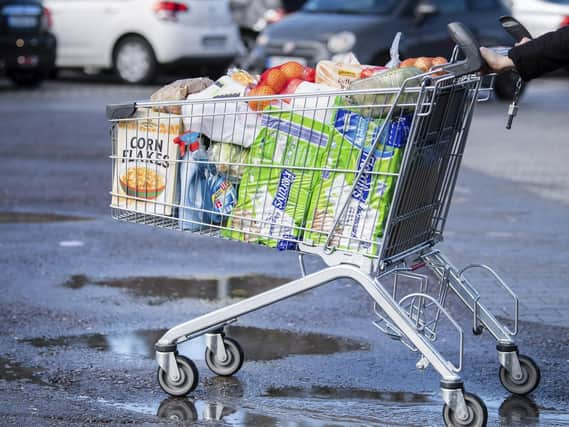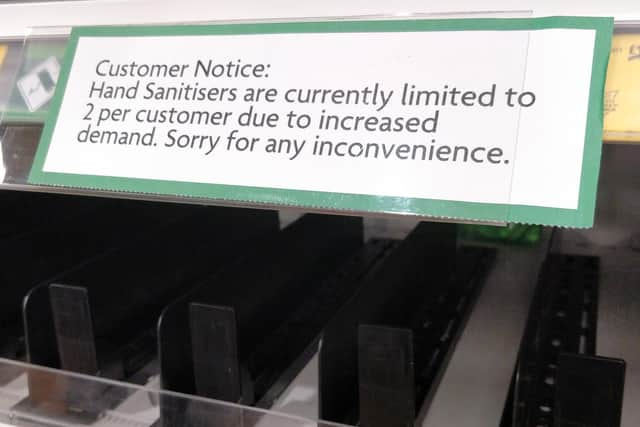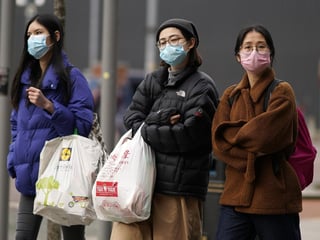How supermarkets are putting customers at risk of coronavirus


Store staff at Tesco, Sainsbury's, Asda and Morrisons are subjected to disciplinary hearings if they are off sick too much, making it highly likely staff come into work with coronavirus symptoms for fear of getting in trouble.
Punitive sickness policies at the big four supermarkets, which have more than two thirds of the share of the grocery market in Britain, mean that infected workers could be working on tills, food counters and stacking shelves.
Advertisement
Hide AdAdvertisement
Hide AdAt Tesco and Morrisons, staff will be given a disciplinary warning if they have more than three periods of absence in six months or their absence rises above 3 per cent.


At Sainsbury’s and Asda, this applies for three periods of absence in a year.
Figures from the Office for National Statistics show that the average UK worker takes 4.4 days off a year, with nearly a third of these due to coughs and colds.
One Sainsbury's worker said after a period of sickness last year where her kidneys failed and she was hospitalised twice, she will be on a final written warning if she calls in sick again.
Advertisement
Hide AdAdvertisement
Hide AdShe said: "I would go to work with coronavirus because it’s not worth the trouble of not going in.
"I feel like regardless of how bad things get I’ll be expected to be in work and if I’m not I’ll be disciplined for it."
Another Sainsbury's worker said: "A couple of weeks ago I was quite ill with a fever. It ended up being tonsilitis but I still went to work despite wondering whether I'd somehow got the coronavirus because I was so worried about losing my job or having another disciplinary.
"I know other people might think it's selfish to still go in to work with that sort of thing but I think a lot of people wouldn't risk being fired before they know for definite and are quarantined."
Advertisement
Hide AdAdvertisement
Hide AdA Tesco worker said: “It's ridiculous because not only does this put other colleagues at risk, it puts customers at risk too.
“At Tesco, there's one man I work with who has been prescribed tramadol by his doctor for severe back pain. He's already having to come into work due to a series of other absences resulting in a formal warning. I can't imagine he'd take time off work for the coronavirus unless it made him far too physically unwell to attend work.
“I haven't had any absences at Tesco yet but I'm still worried about needing time off for coronavirus. If I get a formal diagnosis, at least there's proof I'm not faking it, but I'd be worried that if it turned out to be 'just a cold' it'd reflect badly on me.”
The store worker added: “I imagine a lot of workers will call up only to be told to go in anyway. It all depends what the manager at your store is like.”
Advertisement
Hide AdAdvertisement
Hide AdA spokesman for Usdaw said the shop worker union was in “continual discussions” with supermarkets. He said: “We would expect companies to exclude coronavirus-related absences from any sickness absence procedure that could lead to disciplinary action; this would certainly be an argument we would make if any Usdaw member faced disciplinary action.”
An Asda spokesman said: “We are following the guidance of the government and health organisations NHS and WHO on advising colleagues what to do.’’
Morrisons and Sainsbury’s did not respond to multiple requests for comment from The Yorkshire Post.
This follows days of shortages of food and items like soap and toilet roll at supermarkets as some consumers took to panic-buying essentials.
Advertisement
Hide AdAdvertisement
Hide AdAndrew Opie, director of food and sustainability at the British Retail Consortium (BRC), said supermarkets were doing all they could to ensure there were no product shortages.
“Retailers are putting in place the measures necessary to meet the current increase in demand. Where people are self-isolating, it is up not just to supermarkets, but also friends and neighbours to support them in getting the goods they need. This is a time for everyone to come together and support one another, particularly those who are vulnerable.
“Following requests by the BRC, we welcome the Government announcement that supermarkets with be granted greater flexibility in delivery times to help retailers mitigate the increase in demand for certain products. While there is plenty of stock available, the challenge for retailers has been to make sure all of it reaches shelves at the earliest opportunity.”
Comment Guidelines
National World encourages reader discussion on our stories. User feedback, insights and back-and-forth exchanges add a rich layer of context to reporting. Please review our Community Guidelines before commenting.
